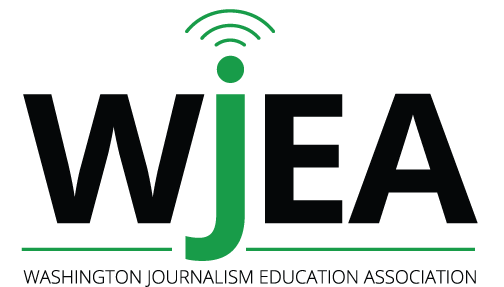New Voices Resources
Attention: STUDENT MEDIA ADVISERS
Washington now has a Student Press Rights ‘New Voices’ Law:
What happens next? Here’s the KNOW THE New Voices Washington presentation to help you figure out what your next steps are.
SUBSTITUTE SENATE BILL 5064
Chapter 125, Laws of 2018 65th Legislature
2018 Regular Session
STUDENT FREEDOM OF EXPRESSION
EFFECTIVE DATE: June 7, 2018
With Gov. Jay Inslee’s signature on Senate Bill 5064, Washington became the 14th state in the US to pass Student Freedom of Expression legislation in the U.S. This law is part of a wave of similar laws passing across the country affirming that the First Amendment applies to students in the school setting, not just adults.
This law will affect some programs more than others, depending on current school policies and practices regarding student control over content in student-produced school-sponsored media. It is critical that all teachers who advise student media become familiar with the law, so they can make sure students know that they, not school officials are responsible for content. This may also include making sure school officials are aware that the law may require changes in school policies and procedures.
For a synopsis explaining the relevant Supreme Court rulings which precipitated the need for laws at the state level, click here.
To read the law in its entirety, click here.
A New Voices Washington State LAW
This media policy language is set up for automatic download.
Suggested WA student media POLICY
A pdf of the information on the WJEA site: WJEA WEBSITE info SB 5064
New Voices Legislation full text: 5064-S.SL
HIGHLIGHTS OF THE LAW
Public High Schools
Student editors at public high schools are responsible for determining the news, opinion, feature, and advertising content of student media.
A student media adviser may not be terminated, transferred, removed, or otherwise disciplined for failing to suppress protected student media.
School officials may only prohibit student media that:
- is libelous or slanderous;
- is an unwarranted invasion of privacy;
- is obscene or indecent pursuant to the Federal Communications Act or any rule or regulation of the Federal Communications Commission;
- violates school district policy or procedure related to harassment, intimidation, bullying, or discrimination;
- incites students to commit an unlawful act on school premises or violate a lawful school regulation; or
- creates a material and substantial disruption of the orderly operation of the school.
A school official must base a forecast of material and substantial disruption on specific facts, including past experience in the school and current events influencing student behavior. A school official may not base a forecast of a material and substantial disruption on an undifferentiated fear or apprehension.
Political expression by students in school-sponsored media may not be deemed the use of public funds for political purposes.
Any student, individually or through the student’s parent or guardian, enrolled in a public high school may file an appeal of an alleged violation, as provided in statute.
Expression made by students in school-sponsored media is not necessarily the expression of school policy.
No school official, governing board of the school, or school district may be held responsible in civil or criminal action for any expression made or published by students in school-sponsored media.
Each school district must adopt a written student freedom of expression policy. The policy may include reasonable provisions for the time, place, and manner of student expression.
Public Institutions of Higher Education
Students at public institutions of higher education have the right to exercise freedom of speech and of the press in school-sponsored media, including media that are supported financially by the school or produced in conjunction with a class. All school-sponsored media produced by students are public forums for expression by student journalists and editors. Student media, whether school-sponsored or non-school sponsored, are not subject to mandatory prior review by school officials.


